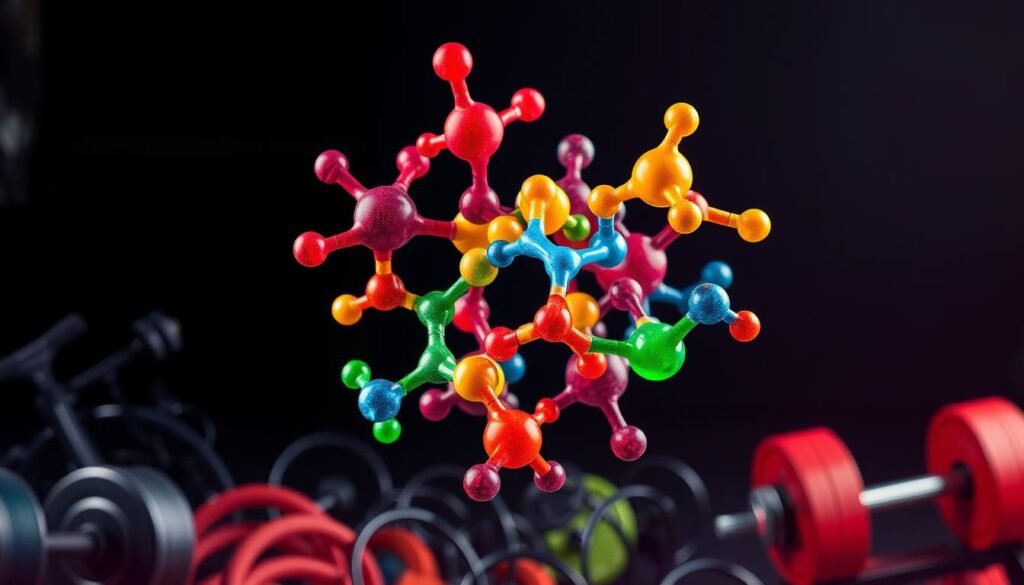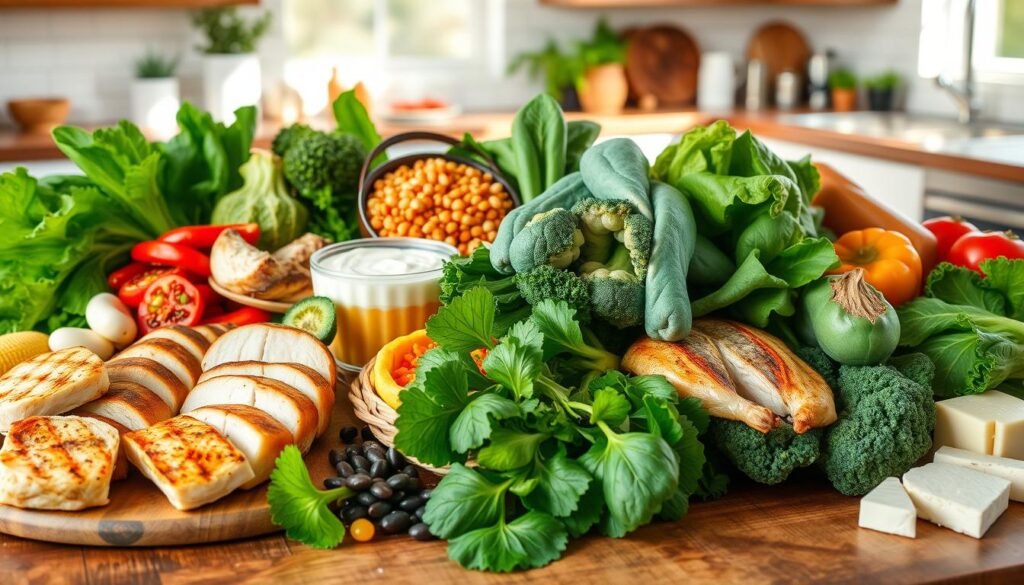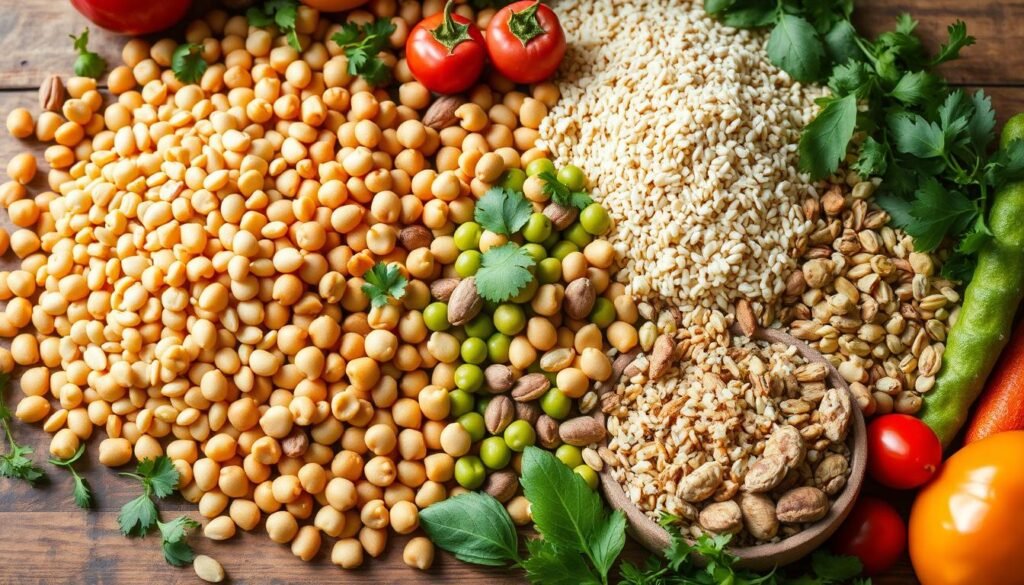Did you know over half of the world’s protein comes from plants? This fact surprises many but shows a big shift towards plant-based diets. The debate on whether animal or plant proteins are better continues. Protein is crucial for muscle growth and recovery after exercise.
It’s important to know where protein comes from for muscle building. Animal proteins have all the amino acids we need for muscle repair. On the other hand, plant proteins are great for vegetarians or vegans. They offer many benefits. The discussion on the benefits of each type for muscle growth and health goes on as people change their diets.
Both animal and plant proteins can help build muscle. But, their effectiveness might change based on what you eat and your health goals. This article will show the good and bad of each. For more on animal vs. plant proteins, check out this link on animal and plant protein sources.
Key Takeaways
- Both animal and plant-based proteins play a crucial role in muscle growth.
- Animal proteins contain all essential amino acids, making them complete sources for muscle recovery.
- Plant proteins are essential for those following vegetarian or vegan diets, but may require combining sources.
- Quality and digestibility differ significantly between animal and plant proteins.
- Incorporating a variety of protein sources can lead to balanced nutrition and improved health outcomes.
Understanding the Importance of Protein for Muscle Growth
Protein is key for building muscle, making up about 80% of it. It helps fix and build tissues, especially after exercise. Getting enough protein every day supports your body’s health, including hormone production.
People who are active need more protein, about 1.2 to 2.0 grams per kilogram of their weight. If you’re into building muscle, you might need more than 2.0 grams. For strength training, the range is 1.6 to 2.2 grams to see good gains. Those wanting to cut fat but keep muscle should aim for 2.3 to 3.1 grams per kilogram.
Eating protein right after lifting weights helps muscles recover and grow. You should have at least 20 grams of protein after your workout. High-protein diets are not only safe but also good for your bones, heart, and how you look.
Different people need different amounts of protein based on things like age and how much they move. Combining more protein with weight training is great for muscle growth. Eating a variety of protein sources gives your body all the amino acids it needs.
The Role of Amino Acids in Building Muscle
Amino acids are essential for making proteins. They help in muscle repair and building. Essential amino acids (EAAs) come from our diet because our body can’t make them. Knowing the amino acid content in foods helps us choose wisely for our health.
Studies have shown that increasing EAA levels can boost muscle building. A significant rise in EAA levels led to a 34% increase in muscle production. This proves how crucial it is to get enough EAAs for muscle growth and healing.

Amino acids do more than build proteins. They start growth processes and help muscles recover after workouts. Optimal amino acid intake has been linked to more muscle mass and strength in legs. For instance, people gained about 1.14 kg of muscle in 12 weeks by eating the right nutrients.
The type of protein you eat matters for muscle recovery. Foods and supplements vary in their amino acid content. This affects how well we can use them to repair and grow muscles.
| Parameter | Week 12 | Week 16 |
|---|---|---|
| Average Increase in Lean Body Mass (LBM) | 1.14 ± 0.36 kg | 0.60 ± 0.38 kg |
| Lower Extremity Strength Improvement | 22.2 ± 6.1% | N/A |
| Improvement in Gait Speed (p-value) | Statistically Significant (p = 0.002) | N/A |
| Timed 5-Step Test (p-value) | Improvement (p = 0.007) | N/A |
| Timed Floor-Transfer Test (p-value) | Improvement (p = 0.022) | N/A |
Animal Protein: Complete Proteins for Optimal Muscle Growth
Animal protein contains all nine essential amino acids. This makes it a complete protein and great for muscle growth. It’s different from many plant proteins, which often miss some amino acids. Including different sources of animal protein in your diet helps with protein intake and muscle recovery.
Sources of Animal Protein
There are many great animal protein options. These offer diverse flavors and are packed with protein. Well-known sources of animal protein are:
- Fish and seafood
- Chicken and turkey
- Lean beef and pork
- Eggs
- Dairy products, like milk, yogurt, and cheese
These not only give complete proteins but also other important nutrients. Nutrients like vitamin B12 and heme iron boost health and help with physical activities. Young adults can gain more muscle by eating these proteins. Studies show they help with muscle recovery and slow down muscle loss as we age.
Benefits of Animal Protein for Muscle Recovery
Animal protein helps muscles recover well because it’s easily digested. Usually, our bodies can use over 90% of the protein from animals. This means better muscle growth when compared to plant proteins.
Animal proteins also have essential nutrients that aid recovery. For example, vitamin B12 is vital for new cells and handling proteins. Eating enough complete proteins meets the body’s needs. This results in stronger performances in both strength training and sports. Research highlights how crucial protein timing is for muscle recovery.

Using high-quality animal proteins can boost muscle strength and recovery. This shows how vital these proteins are for a diet aimed at muscle growth. For more on animal versus plant proteins, check this study. To understand more about health benefits, like bone and joint health, visit this resource.
Plant-Based Protein: The Growing Alternative
More people want sustainable and healthier eating options today. Plant-based protein is becoming a key choice for those aiming to boost muscle growth. It’s cool to know that plant-based diets can be as good as meat diets for muscles. This is true if you eat enough protein.
Top Plant-Based Protein Sources
There are many plant-based proteins to choose from. You can easily meet your nutrition needs. Let’s look at some top plant protein picks:
- Legumes: Soybeans, kidney beans, lentils, and split peas have 20 to 25 grams of protein per 100g.
- Seeds: Hemp, pumpkin, sesame, and chia seeds have 20 to 30 grams of protein per 100g.
- Nuts: Peanuts have around 26 grams of protein per 100g. Almonds, pistachios, and cashews are good too.
- Tofu and Tempeh: Both are about 12 grams of protein per 100g and are great meat replacements.
- Grains: Oatmeal has 13 grams of protein per 100g and is versatile in meals.
- Spirulina: With 70% protein content, it beats meat, making it a superfood.

Addressing the Completeness of Plant Proteins
One worry about plant-based protein is if it’s “complete”. Some plant proteins don’t have all essential amino acids. These are needed for the best muscle growth. Yet, mixing different foods can solve this. Like rice with beans gives you full protein.
Here are ways to get complete plant proteins:
- Including various proteins in your daily eating.
- Mixing different plant proteins for all amino acids.
- Adding supplements if needed, especially for vitamins and minerals not found in some plant foods.
It’s vital to keep your diet balanced for muscle recovery and growth. A mix of different types of food helps. This ensures you get all amino acids needed for muscle building and staying healthy.
Protein Power to Maximize Muscle Growth: Animal vs. Plant-Based
Recent studies show both animal and plant proteins help muscles grow. Animal proteins are full of essential amino acids and are easy to digest. On the other hand, plant proteins, like those from fungi in Quorn products, also boost muscle growth during workouts.
The idea that only animal proteins build muscle is being questioned. Young adults eating soy, quinoa, nuts, and legumes have shown muscle growth similar to those eating meat. This means people can switch to plant proteins and still reach their fitness goals. Plus, it’s good for their health and the planet.
Though animal proteins have more leucine, an important amino acid, plant proteins can also do the trick. Mixing different plant proteins, like edamame, tofu, and legumes, covers all amino acid needs. This approach ensures a protein-rich diet, crucial for muscle building.
Choosing between animal and plant proteins is a personal decision. It depends on what health goals and values someone has. With a balanced diet, people don’t have to give up muscle gains to eat the way they prefer.
Digestibility and Absorption Rates: Which Protein Wins?
Understanding digestibility and absorption rates of protein is key for muscle growth and recovery. Factors such as source impact how well our bodies use protein. Studies show that animal proteins are usually digested better. This means they deliver amino acids to muscles faster after working out.
Whey protein isolate absorbs quickly at 20 grams per hour, taking about 1 hour per serving to digest. On the other hand, whey concentrate takes longer, absorbing at 10 grams per hour and digesting in 2 hours. Casein, absorbing at just 3 grams per hour over 6-7 hours, offers slower recovery post-workout.
Pea protein and other plant proteins absorb at 5-7 grams per hour, digesting in 3-4 hours. Meanwhile, animal proteins like chicken or fish not only absorb at similar rates. They also offer more amino acids for better muscle recovery. This shows that the type of protein matters for your fitness goals.
Choosing between animal and plant protein depends on personal choice and dietary needs. For quick recovery after exercise, whey and other animal proteins are beneficial. Still, many athletes mix both types for variety in their diets.
To see more on protein absorption rates and details, check out this resource. The right protein choice can impact your performance and recovery. Knowing about protein digestion helps you plan your diet to meet fitness goals.
Protein Quality Assessment: PDCAAS and DIAAS Explained
Protein quality greatly affects muscle growth by determining amino acid utilization. Two key measures are the Protein Digestibility Corrected Amino Acid Score (PDCAAS) and the Digestible Indispensable Amino Acid Score (DIAAS). These methods assess how well proteins fulfill human needs, but they have different strengths.
Comparison of Protein Quality Between Sources
PDCAAS has limitations despite its wide use. It compares amino acids to a reference protein and maxes out at a score of 1. This cap can hide the true value of higher-quality proteins. On the other hand, DIAAS looks at each amino acid’s absorbed amount and digestibility. This method does not limit scores, recognizing proteins that surpass essential amino acid needs.
The Food and Agriculture Organization (FAO) prefers DIAAS for more accurate protein quality representation. Generally, animal proteins score better with DIAAS than plant-based ones. For example, Radix Whey Protein DIAAS Complex™ scores a high 1.61. Meanwhile, Radix Plant Protein DIAAS Complex™ gets a respectable 1.30, showing that plant proteins can also be effective.
| Protein Source | PDCAAS Score | DIAAS Score |
|---|---|---|
| Radix Whey Protein DIAAS Complex™ | 1.0 | 1.61 |
| Radix Plant Protein DIAAS Complex™ | 0.9 | 1.30 |
| Egg Protein | 1.0 | 1.44 |
| Soy Protein | 0.9 | 0.85 |
Understanding PDCAAS and DIAAS helps us choose better protein sources. Athletes and muscle-focused individuals should consider high DIAAS proteins in their diets. For more info on protein quality, check this important resource.
Utilizing Protein Powders and Supplements for Muscle Gain
Many athletes use whey and casein protein to help with muscle growth. Even though protein supplements may not help beginners much at first, they show benefits with regular, intense training. Over time, using protein supplements while training hard can lead to bigger muscles and more strength.
For athletes, the right amount of protein ranges from 1.4 to 2.0 grams per kilogram of their weight. This means a 175-pound person should aim for 111–159 grams of protein daily. It’s more effective to mix protein powders into your meals for recovery and muscle care. Also, trying different protein sources like hemp, soy, and pea protein is good, besides just whey and casein.
Protein supplements can boost muscle building and hormone levels that help grow muscle. But, taking too much protein for a long time can harm the kidneys and liver. Also, it’s crucial to pick safe protein supplements without harmful metals like lead or cadmium. A balanced diet along with sensible protein supplement use is best for building muscle safely.